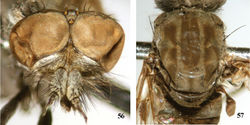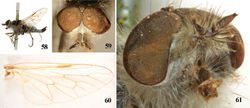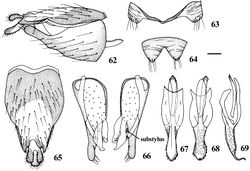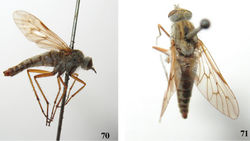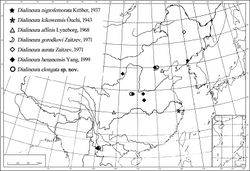Dialineura affinis
| Notice: | This page is derived from the original publication listed below, whose author(s) should always be credited. Further contributors may edit and improve the content of this page and, consequently, need to be credited as well (see page history). Any assessment of factual correctness requires a careful review of the original article as well as of subsequent contributions.
If you are uncertain whether your planned contribution is correct or not, we suggest that you use the associated discussion page instead of editing the page directly. This page should be cited as follows (rationale):
Citation formats to copy and paste
BibTeX: @article{Liu2012ZooKeys235, RIS/ Endnote: TY - JOUR Wikipedia/ Citizendium: <ref name="Liu2012ZooKeys235">{{Citation See also the citation download page at the journal. |
Ordo: Diptera
Familia: Therevidae
Genus: Dialineura
Name
Dialineura affinis Lyneborg, 1968 – Wikispecies link – Pensoft Profile
- Dialineura affinis Lyneborg, 1968: 157. Type locality: Sichuan, China (Holotype deposited in U. S. National Museum, Washington D. C.); Zaitzev 1971[1]: 187; Yang 1999[2]: 186.
Diagnosis
Frons with white pile. Pterostigma of wing brownish yellow. Male gonocoxite narrow apically and with substylus in interior margin; distiphallus serrated at lateral edges.
Redescription
Male. Body length 8.1–8.5 mm, wing length 6.0–7.2 mm.
Head (Fig. 59) with dense pale pubescence over black ground color. White pile on frons and from gena to occiput, brown pile on ocellar tubercle, parafacial bare, upper occiput also with some black postocular setae. Eyes reddish brown and nearly contiguous on upper frons. Antenna with dense pale pubescence over black ground color; black setae on scape long and thick, but those on pedicel short and thin, scape also covered with long white pile, first flagellomere nearly bare; central part of first flagellomere widest; style resting apically on first flagellomere with a tiny distal spine; antennal ratio: 5.3 : 1.0 : 4.3 : 0.8. Proboscis brownish yellow with short brown pile; palpus pale brownish yellow with white pile.
Thorax with dense pale pubescence over black ground color (as the pubescence on the mesonotum of specimens are totally scraped off, the pattern on the mesonotum is unknown). Notum with dense white pile, prosternum and pleuron with dense white pile; macrosetae on thorax black. Scutal chaetotaxy (pairs): np 3, sa 2, pa 1–2, dc 2, sc 2. Coxae and trochanters pale pollinose over black ground color, femora with pale pubescence over black ground color except apices brownish yellow, tibiae brownish yellow with dark brown apices, all tarsomeres 1 brownish yellow with dark brown apices, other tarsomeres dark brown. White pile present on coxae and femora, setae on legs black. Fore coxa with a 1, av 1; mid coxa with a 3; hind coxa with a 2, d 1. Fore and mid femora without any prominent setae; hind femur with av 6, pv 3. Fore tibia with ad 3–4, pd 3, pv 4, apically with 4–5 setae; mid tibia with ad 3–4, pd 4, av 5, pv 4, apically with 6 setae; hind tibia with ad 7–9, pd 8, av 7–8, pv 6–7, apically with 5 setae. Wing (Fig. 60) hyaline tinged yellow; pterostigma very narrow, brownish yellow, at end of R1; veins brown except upper basal surface of wing yellow. Halter stalk yellow but dark brown apically; knob brown.
Abdomen with dense pale pubescence over black ground color, except tergite 1 and terminalia with very thin pubescence so that ground color is visible, posterior margin of each segment pale yellow. White pile on abdomen and terminalia. Male genitalia: Epandrium (Fig. 65) elongated, 1.5 times longer than wide, apically narrowed with a triangular medial invagination. Subepandrial sclerite trapezoid, little longer than cercus. Gonocoxite (Fig. 66) with substylus, relatively narrow apically. Distiphallus (Figs 67–69) short and curved, serrated at lateral edges.
Female. Unknown.
Materials
3 male, CHINA: Tianjin, Qingguang Farm (39°13'N, 117°00'E), 9. IV. 1965; 1 male, CHINA: Tianjin, Qingguang Farm (39°13'N, 117°00'E), 10. IV. 1965. The collectors are totally unknown.
Distribution
Oriental region: China (Sichuan); Palaearctic region: China (Tianjin) (Fig. 73). This is biogeographically part of Southwest Region and North China Region (Zhang 1999[3]).
Remarks
Lyneborg (1968)[4] first described Dialineura affinis from Sichuan, China as a very special species because of “The face bears long blackish hairs similar to those on the frons”, and he gave the figures of male genitalia. Irwin and Lyneborg (1981a)[5] pointed it out again - “Lateral portion of face usually bare, only pilose in affinis Lyneborg from China” – as an exception of the general characters of Dialineura. Zaitzev (1971)[1] recorded it in the revision of Palaearctic species of the genus Dialineura. Yang (1999)[2] included it into the key to species of Dialineura from China. We find the structures of male genitalia of our materials are almost same as Dialineura affinis, especially in the distiphallus with the serrated lateral edges; therefore we identify our materials as Dialineura affinis. However, the parafacial (Fig. 61) of our specimens are totally bare without any pile or setae, if the “face” (Lyneborg 1968[4]) and the “lateral portion of face” (Irwin and Lyneborg 1981a[5]) refer to the same structure of parafacial. Moreover, the frons (Fig. 56) of our specimens are covered with only white pile instead of blackish setae.
Taxon Treatment
- Liu, S; Yang, D; 2012: Revision of the Chinese species of Dialineura Rondani, 1856 (Diptera, Therevidae, Therevinae) ZooKeys, 235: 1-22. doi
Other References
- ↑ 1.0 1.1 Zaitzev V (1971) Revision of Palaearctic species of the genus Dialineura Rondani (Diptera, Therevidae). Entomologicheskoe Obozrenie 50 (1): 183-199.
- ↑ 2.0 2.1 Yang D (1999) One new species of Dialineura from Henan (Diptera: Therevidae). Fauna and Taxonomy of Insects in Henan 4: 186-188.
- ↑ Zhang R (1999) Zoogeography of China. Science Press, Beijing, 487 pp.
- ↑ 4.0 4.1 Lyneborg L (1968) On the genus Dialineura Rondani, 1856 (Diptera, Therevidae). Entomologisk Tidskrift 89: 147-172.
- ↑ 5.0 5.1 Irwin M, Lyneborg L (1981a) The genera of Nearctic Therevidae. Illinois Natural History Survey Bulletin 32 (3): 1-277.
Images
|
